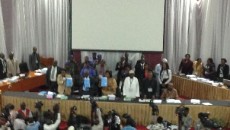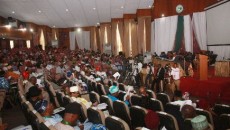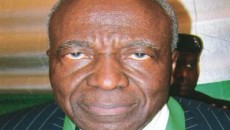Delegates were asked to show themselves as responsible and distinguished persons.
The delegates to the ongoing National Conference who stay away from plenary sessions will from Monday forfeit their sitting allowance.
This was stated by the Vice Chairman of the Conference, Bolaji Akinyemi.
On Thursday, shortly after the Conference adopted the votes and proceedings of Wednesday’s plenary sitting, the Chairman, Idris Kutigi, called on Mr. Akinyemi to address the delegates.
Mr. Akinyemi read the riot act to the delegates, cautioning them to show themselves as the responsible and distinguished persons they are.
He said the Federal Government was worried at the low turnout of delegates to the Conference. He pointed out that when people are paid allowances, they should be seen to be doing that for which they were paid.
He lamented that attendance to plenary sittings has seriously dwindled since the Conference commenced considering the reports of 20 standing committees.
Mr. Akinyemi lamented that more than half of the seats at the Conference were empty, a situation which indicated that 50 per cent of delegates did not turn up for plenary.
“They are reminding us that when members of an intervention agency are paid sitting allowances, they should sit. We are considering not paying allowances to those who do not turn up for plenary.
We do not want to be pushed to a situation where we treat esteemed delegates like primary and secondary school students. We don’t want it to get to that. We are all very responsible people and we should show that here.
“With effect from Monday, delegates who do not show up will not be paid sitting allowance except on health reasons and that should have been communicated to you in and hope that I never offended any of you,” he announced.
Meanwhile, during the debate on the report of the Committee on Civil Security, Youth and Sports, tension which had soaked the house eased.
Many delegates who spoke called for the creation of an internal funding system for civil society groups and appropriate mechanism to regulate their operations.
Awalu Yadudu had called for the proper regulation of civil societies in the country and the creation of a legal framework for their funding.
Ebele Okeke suggested that men who rape toddlers and young boys should face the firing squad to serve as a deterrent to others. She argued that many of the children who are raped grow up to become terrors to the society. She said that there was an urgent need to stop all forms of rape in the country.
Yadoma Bukar asked that the age to stand for election into the National Assembly be reduced to 25 years.
With so many youth out of jobs, she called for the merger of empowerment agencies of the government to properly address the growing unemployment in the country.
She said, “If age is nothing but a number and youth just a title, I want to urge that Nigerian youth should be given opportunity to serve the country.”
Mike Ozekhome said while the committee had made fantastic recommendations that would take the country to greater heights, civil society organisations were trouble-shooters and should not be seen as trouble makers. While supporting the call for the regulation of civil society groups, he drew attention to the fact that many of such groups were fakes and should be weeded out.
Mr. Ozekhome also called for tougher action against companies and firms that still engaged casual workers in the country.
Salome Jankada called on men to take responsibility for their children. She suggested that financial institutions should be made to plough part of their profits for the development of Nigerian children. She added that there was no need for the institutions to declare huge profits but fail to invest it on bettering the condition of youth and children.
“The banks should be given responsibility because they are part of the society and they make so much money and declare huge profits too,” she said.
Alfred Diete-Spiff argued that the National Youth Service Corps, NYSC, was supposed to reach out to all youth and not only graduates.
He, therefore, suggested that the scheme be extended to include youth from the age of 18 so that the country would reap immense benefit from it.
“The NYSC should therefore, be extended to accommodate youth from 18 years. It is about time, we expanded the scheme to incorporate all youths to create a National Peace Builders Corps,” he said.



